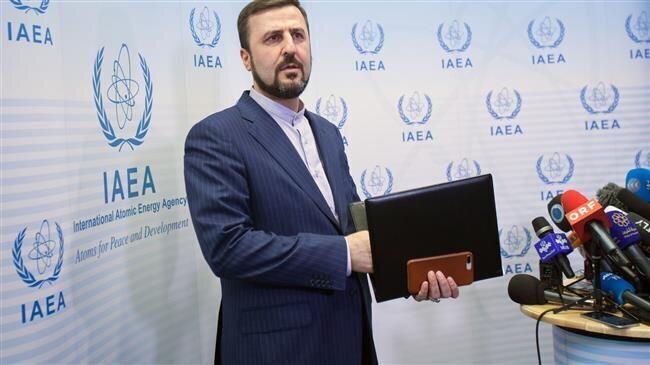Tehran rejects Grossi’s assessment on Iran-IAEA cooperation

TEHRAN - Iran’s ambassador to the International Atomic Energy Agency (IAEA) has responded to the assessment of IAEA chief Rafael Grossi about the quality of cooperation between Iran and the UN body, advising him to avoid politicizing the Iranian nuclear program.
Ambassador Kazem Gharibabadi said Rafael Grossi’s assessment that a lack of progress in cooperation between Iran and the IAEA seriously affects the Agency’s ability to make sure that Iran’s nuclear program is exclusively peaceful was not credible.
In his opening statement to the quarterly session of the IAEA Board of Governors, Grossi claimed that technical discussions between the IAEA and Iran have not yielded the expected results, and the lack of progress in clarifying the Agency’s questions concerning the correctness and completeness of Iran’s safeguards declarations seriously affects the ability of the IAEA to provide assurance of the peaceful nature of Iran’s nuclear program.
“Iran has provided no new information in relation to one location, has not answered any of the Agency’s questions nor provided any information in relation to two other locations, and provided a written statement on a fourth location without any substantiating documentation,” Grossi said, according to a statement issued by the IAEA.
The statement added, “Since February, verification and monitoring activities have been affected as a result of Iran’s decision to stop the implementation of its nuclear-related commitments under the Joint Comprehensive Plan of Action (JCPOA) and the Additional Protocol, which gives broader access to IAEA inspectors throughout a country.”
Grossi also claimed that some sensitive nuclear materials were found in locations not declared to the IAEA and called on Iran to provide answers in that regard.
“I reiterate the requirement for Iran to clarify and resolve these issues without further delay by providing information, documentation and answers to the Agency’s questions.”
Gharibabadi said Grossi’s remarks were another sign that the IAEA has adopted a biased approach against Iran.
“@rafaelmgrossi positions show the biased approach of the Secretariat vis-à-vis its interactions with Iran, which ignores the level of cooperation and engagement. This approach could turn into an obstacle for future good-will interactions between the two sides,” he warned on Twitter.
Gharibabadi added, “The Agency report lacks triple C: it's not ‘consistent’ in relations with the background of cooperation between two sides; it's not ‘credible’ since is not based on reliable sources; it's not ‘convincing’ since does not contain all aspects of the cooperation and progress made.”
He continued, “Constructive engagement requires positive environment, avoiding expressing any pre-judgment and artificial concerns, as well as unnecessary overstatement of a few trivial issues. The Agency shouldn't act as if it's supporting the political agenda of some against the others.”
The Iranian diplomat called on the IAEA to avoid politicization and take a clear position on the nuclear threat posed by Israel.
“The Agency has to distance itself from any political agenda and must take a clear stand on the Israeli regime’s nuclear threat and unacceptability of it remaining outside the NPT and its continuing defiance to place all its nuclear activities and facilities under safeguards,” Gharibabadi continued.
Diplomatic tensions have escalated between Iran and the IAEA in recent weeks as the Agency refused the level of cooperation Iran provided.
Recently Iran sent a letter to the IAEA announcing the expiration of a February deal between the IAEA and Iran. The letter was sent after the Agency released a quarterly report on Iran in which it accused Iran of failing to explain traces of uranium found at several allegedly undeclared sites.
Gharibabadi, who delivered the letter to the IAEA, had provided details about the February deal, which contained details about Iran’s decision to announce the expiration of that deal.
The February deal was signed between director of the Atomic Energy Organization of Iran (AEOI)Ali Akbar Salehi and IAEA chief Grossi in Tehran.
“We delivered this letter to the Director-General of the Agency yesterday, which addresses two issues. One [aspect of the letter] is about a joint agreement we had with the Agency to record data from some of the Agency's surveillance cameras for three months without providing the data to the Agency, and if we reach an agreement on nuclear issues and the outcome as well as the lifting of sanctions after three months, then we will provide information to the Agency,” he told the state TV.
According to Gharibabadi, safeguards issues constitute another aspect of the letter. “The letter explicitly states that Iran has all kinds of interactions and cooperation with the IAEA and that we are still ready to work with the IAEA to resolve a number of safeguards issues, but the IAEA must work with a neutral and non-political approach to conclude these issues as soon as possible,” he noted.
Underlining that the AEOI-IAEA deal expired on May 24, the Iranian diplomat said, “There were contacts and requests from the Agency and the countries that are negotiating with us in the framework of the JCPOA talks to extend this understanding for another period. This issue was examined internally and the conclusion was that this understanding could not be legally extended, but the Islamic Republic of Iran decided to continue recording data for another month in its own good faith and as an independent decision and not a legal decision.”
He added, “What happens next month and what we do with this data is an independent sovereign decision that takes into account a number of factors, including the Agency's approach and technical approaches, especially in negotiations with us on safeguards as well as political negotiations in the field of the JCPOA.”
Leave a Comment